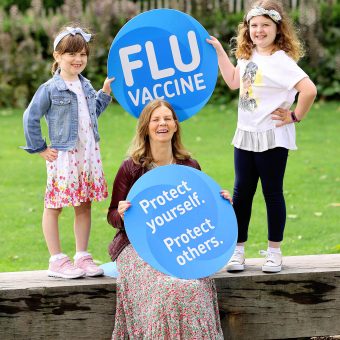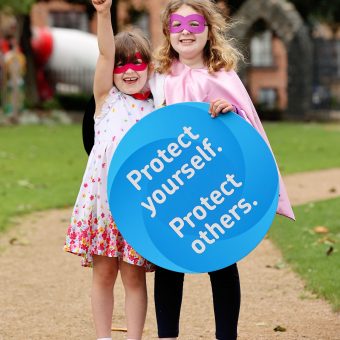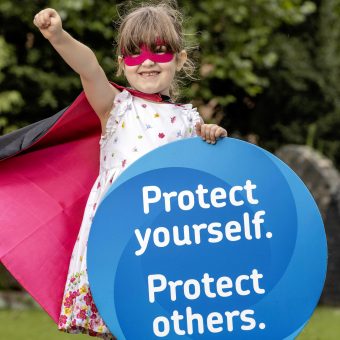HSE launches Children’s Flu Vaccine campaign:
Children aged 2 to 12 can now get the nasal flu vaccine for free.
www.hse.ie/flu
The HSE today, Monday 12th October, launched the first Children’s Flu Vaccine campaign in Ireland. This autumn, children aged 2-12 years will be offered the flu vaccine free of charge. Your GP or pharmacist will give the vaccine using a spray up your child’s nose (nasal vaccine).
The flu vaccine will help protect your child against flu and reduce the spread of flu to others, for example their brothers and sisters, parents and grandparents. If enough children are vaccinated against flu, fewer children and adults will need to see their doctor or need treatment in hospital because of flu. This is very important for our health services especially during the Covid-19 pandemic.
Flu vaccine heroes, Megan Ayres (9) and Evelyn Ayres (6) from Co. Meath, got their flu vaccine to protect themselves and their Grandma, Geraldine Murtagh (Images: Marc O’Sullivan Photography).
Symptoms of flu in children include a high temperature, muscle pains, headache and extreme tiredness (fatigue). They may also have a dry cough and sore throat. It may be difficult to tell the symptoms of flu from symptoms of Covid-19. Children who are sick with flu miss days in crèche, childcare and school. They also miss out on their usual activities such as hobbies and sports. Children carry the flu virus in their system longer than adults do, and children can spread the flu virus easily to other children and to vulnerable people around them. Children are more likely than adults to get severe complications of flu. Over the last ten years in Ireland 4750 children need to be admitted to hospital because of complications of flu. 183 of these then had to go to intensive care, and, sadly 41 children died. Children with chronic health conditions are most at risk of the serious complications of flu.
Dr Colm Henry, Chief Clinical Officer of the HSE says:
The flu vaccine for children is a very safe vaccine and has been given to children in the US since 2003 and in the UK since 2013. The flu vaccine helps your child’s immune system to produce antibodies that fight infection, and it will not result in your child getting the flu. If your child has had the flu vaccine and they come into contact with flu virus, these antibodies attack the virus and stop children from getting sick.
Dr Chantal Migone, Specialist in Public Health Medicine with the HSE’s National Immunisation Office explains what you can expect:
Your GP or pharmacist will give the vaccine using a spray up your child’s nose. They will spray once in each nostril. There is no need to take a deep breath or sniff, your child can breathe normally while they are getting the vaccine. The vaccine is absorbed very quickly and it is pain free. So, if your child sneezes or gets a runny nose after the vaccine, there is no need to repeat the dose, or to worry that it won’t work. The most common side effects are mild, your child may get a runny or blocked nose, headache or muscle aches. Some children get a fever (temperature) after the vaccine, but it is usually mild and goes away on its own.
Paul Reid, CEO of the HSE said:
The HSE has purchased 600,000 doses of the nasal flu vaccine (LAIV) for children aged 2-12 years old. I would encourage all parents to avail of the free vaccine for your children to protect themselves and to protect others by reducing the spread of flu. This is so important for our health services, especially this winter.”
Stephen Donnelly TD, Minister for Health said:
We all know that the winter ahead will be challenging as we continue to manage the Covid-19 pandemic while also dealing with the flu and other illnesses. If we can avoid catching and spreading the flu, we will limit the impact on the health service over the coming months and ensure that our healthcare workers can continue to care for all patients, both those with Covid-19 and those with other needs. The vaccine will help to protect you, and will also help to prevent the spread of flu among your family, friends and colleagues.
The flu vaccine is free for those in at-risk groups and for people working in healthcare, as well as all children between the ages of 2 and 12. This vaccine will protect the children of Ireland against flu, which unfortunately can be a serious and, tragically, sometimes fatal, illness for young people. I am appealing to parents and guardians across the country to bring their children to get the flu vaccine. It will help to keep children safe and healthy throughout the winter months.
Adrian and Nora O’Hare’s daughter, Aralynn, got the flu in Feb 2018 when she was 4 years old. Aralynn was an active and healthy child, but after developing a bacterial infection on her lungs as a complication of the flu, she spent a month in ICU in Crumlin. Aralynn’s parents urge others to avail of the children’s flu vaccine:
Our whole family will get the flu vaccine this year, and I would encourage anyone to get their kids vaccinated against the flu. It’s so quick and now that it’s free there is no excuse. If it can save one family what Aralynn and our family went through it’s so worth it.
A very small number of children will not be able to get the nasal flu vaccine for medical reasons. Your child should not get the nasal flu vaccine if they:
- Have had a severe allergic reaction to a previous dose of the flu vaccine or any of its ingredients
- Have severe asthma or if they have been wheezy or needed their inhaler more than usual in the three days before the vaccination
- Are taking medicines called salicylates, which include Aspirin
- Have a severely weakened immune system because of certain medical conditions or treatments
- Are living with someone who has a severely weakened immune system (such as a person who is in isolation because of a recent bone marrow transplant)
If your child cannot get the flu vaccine using a nasal spray, your GP or pharmacist will talk to you about giving your child a different flu vaccine, which is given by injection.
The HSE has developed easy read guides in English and translated them into Arabic, French, Romanian, Russian, Urdu, Slovak and Czech. We also worked with the COVID World Service to produce videos with GPs around the country. For more see https://www.hse.ie/eng/health/immunisation/pubinfo/flu-vaccination/information/
Adults in at-risk groups:
The HSE also urges all adults in at-risk groups to get their flu vaccine. If you are at risk of the complications of flu, the flu vaccine is available to you free of charge from a GP or pharmacist. The flu vaccine is also available free of charge to healthcare workers and carers, to protect them and to prevent the spread of flu to the vulnerable people they care for.
Influenza vaccine is recommended if you:
- Are 65 years of age and over
- Are pregnan
- Are a child aged 2 to 12 years (new for 2020/2021
- Are an adult or child aged 6 months or older with a long-term health condition
- Were born with Down syndrome
- Live in a nursing home or other long-term care facility
- Work in healthcare
- Are a carer or live with someone who is at risk of flu because of a long-term health condition
- Are a carer or live with someone who has Down syndrome
- Are in regular contact with pigs, poultry or waterfowl should get the flu vaccine.
The HSE is not involved in the procurement or distribution of private stock.
Notes:
The 2020 / 2021 flu vaccine
This year’s seasonal flu vaccine contains protection against 4 strains of flu virus. These are recommended by the World Health Organization (WHO) as the strains most likely to be circulating this season.
The four strains are:
- an A/Guangdong-Maonan/SWL1536/2019 (H1N1)pdm09-like virus
- an A/Hong Kong/2671/2019 (H3N2)-like virus
- a B/Washington/02/2019 (B/Victoria lineage)-like virus
- a B/Phuket/3073/2013 (B/Yamagata lineage)-like virus
The 2020/2021 HSE seasonal vaccination programme will offer 2 vaccines.
- the Quadrivalent Influenza Vaccine (split virion, inactivated) manufactured by Sanofi Pasteur for people with long term conditions.
A Patient Information Leaflet and the Summary of Product Characteristics are available from www.hpra.ie - the Fluenz Tetra nasal spray suspension Influenza vaccine (live attenuated, nasal) manufactured by AstraZeneca AB for children aged 2 to 12 years
A Patient Information Leaflet and the Summary of Product Characteristics are available from www.hpra.ie
Want to get €5, absolutely free? Sign up to the ‘Smart’ Debit Card – Curve today, and earn a fiver on us! Find out more here.




